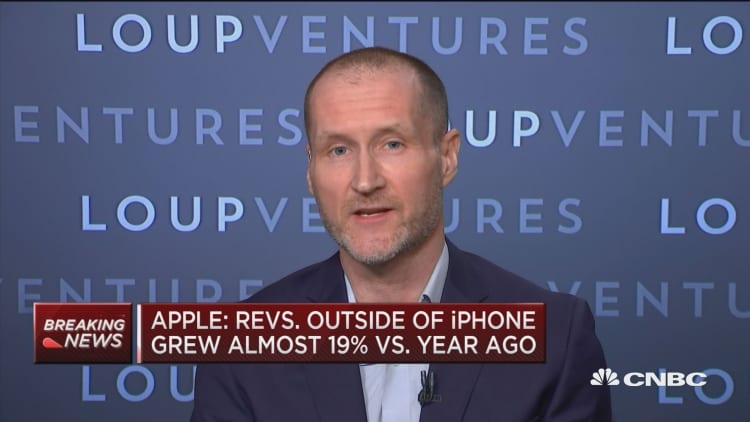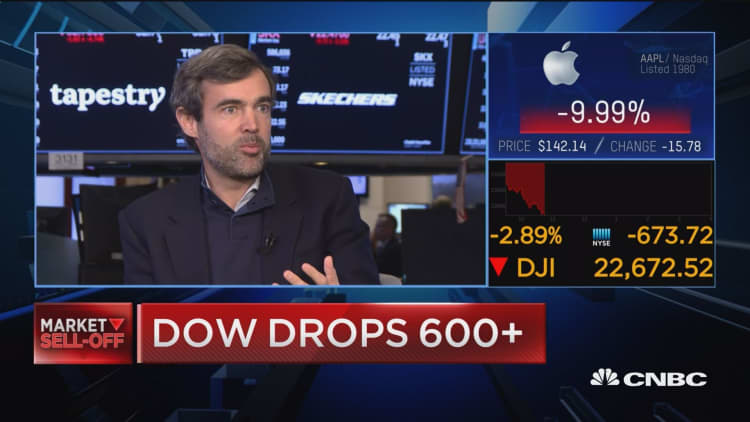
Overpriced iPhones, anemic innovation and market saturation forced Apple on the first trading day of the year to take a bite out of its revenue guidance, analysts and investors told CNBC on Thursday.
After cutting fiscal first-quarter guidance by about 8 percent on Wednesday, CEO Tim Cook heaped much of the blame on China's economy and Sino-U.S. trade relations in a preliminary disclosure.
Apple bull Gene Munster, who predicts the tech giant will be a top performer in the so-called FAANG group, said the cut is not because of competition or a shift in consumer needs.
"This is caused by some issues around economics and some mistakes the company's made around aggressively pricing their phones," the Loup Ventures founder said on "Squawk Box." "They jumped the price [of iPhones] by 23 percent this fall."
Apple reduced its revenue estimates, from as much as $93 billion to $84 billion, along with gross margin. The decrease was driven, among other factors, by weaker-than-expected iPhone sales in emerging markets with a shortfall coming "primarily in greater China," Cook said in an interview with CNBC's Josh Lipton on Wednesday.
But AlphaOne Capital Partners' Dan Niles, who turned sour on the stock last May, told CNBC on Thursday that many of the challenges Cook pointed to were already known halfway through 2018. He scolded Apple for having the "wrong strategy" in raising iPhone prices in emerging markets, including Brazil, Russia and India.
"Part of the issue here is that Apple's not acknowledging the real problems that they have," Niles said later on "Squawk Box."

Apple misfired in jacking up average selling prices and releasing a software update prematurely while facing pressure from a Qualcomm lawsuit, Niles said. Apple is also behind schedule on a 5G phone launch at a time when carriers are prepared to push out the 5G network, Niles said, and when the cell phone market is shrinking "for the first time in history, and it will probably shrink even further in 2019."
"They're kind of behind on the technology ... you can't fix the problem until you acknowledge what the problems actually are or you recognize them," he added.
Niles said the stock is not attractively priced from a long-term perspective because the company was going in the "wrong direction for an economy that's slowing down" and he expects the phone market to see contraction "for several more years."
Shares of Apple touched a 52-week low of $142.08 in midday trading.
The company's iPhone sales woes are compounded by the fact that customers have held on to their devices longer than they have in the past, New Street Research's Pierre Ferragu told CNBC. Ferragu, head of New Street's global technology infrastructure research team, attributes just 20 percent of Apple's weaknesses to China's economy and the rest to demand for its products.
The firm in August downgraded Apple to sell because the iPhone X caused a spike in upgrades that sucked up demand for future generations this year.
"We have to be more cautious" because demand is becoming a headwind, Ferragu said Thursday on "Squawk on the Street."
"Innovation is slowing down in the way it's perceived by consumers ... [and] these iPhones are getting more and more expensive ... and so you think of it twice before refreshing your hardware," he added.

Ferragu said his firm has since cut its price target from $165 to $140 but acknowledged that revenue is growing elsewhere at the company largely because of its services business.
"What we think is that Apple doesn't have any specific ... further downside risk, so we upgraded to neutral, but our price target is $140 as we think the stock is where it should be now," he said.
Apple's stock is effectively in bear territory, falling nearly 40 percent from a high of $233.44 in October.


